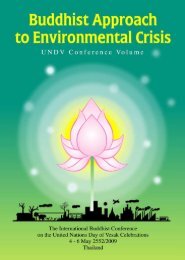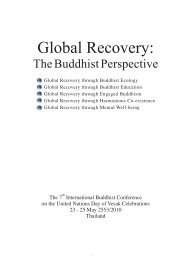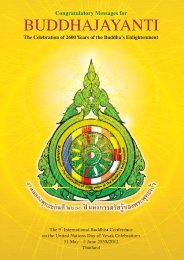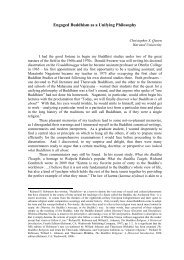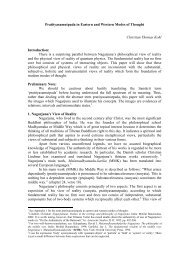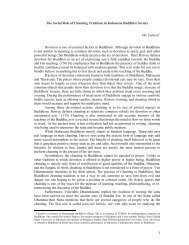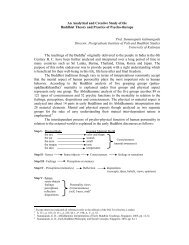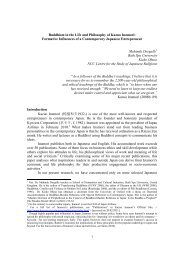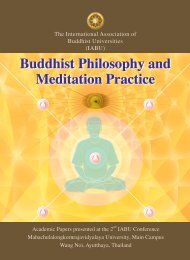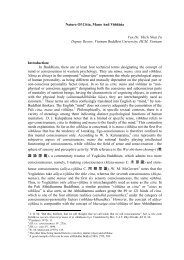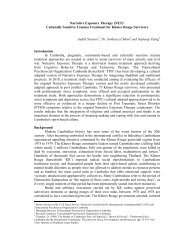American Habits and Fresh Baked Bread Cynthia Drake Naropa ...
American Habits and Fresh Baked Bread Cynthia Drake Naropa ...
American Habits and Fresh Baked Bread Cynthia Drake Naropa ...
Create successful ePaper yourself
Turn your PDF publications into a flip-book with our unique Google optimized e-Paper software.
communities. All use the mindfulness bell innovated by Thich Nhat Hanh. And all teach<br />
the traditional Tibetan compassion practice of tonglen.<br />
Hybridity is further found amongst the teachers of the three sanghas. All three<br />
sanghas feature senior teachers that have trained outside their primary tradition. This<br />
sharing <strong>and</strong> cross-pollination reflects the dramatic access that <strong>American</strong>s have to dharma<br />
teachers <strong>and</strong> teachings. Anyone with a computer can spend hours every day listening to<br />
talks <strong>and</strong> meditation instruction from the some of the most powerful Buddhist teachers<br />
living today. Moreover, individuals who can get to a major city have a chance to see<br />
many of today’s great teachers live. These common features collectively mark an<br />
important shift in how Buddhism is received <strong>and</strong> experienced by new practitioners today<br />
as compared with 50 years ago. It is an embarrassment of riches which has given rise to a<br />
generation of <strong>American</strong>s who have seen more dharma talks, <strong>and</strong> met more meditation<br />
masters, than arguably any other culture at any other time in history. But does that mean<br />
that America is more enlightened?<br />
The Shoppers, The Swappers, The Stoppers<br />
What has been the impact of so much dharma circulating throughout the United<br />
States? I believe that this era, this century, will have a profound <strong>and</strong> lasting impact on the<br />
future, but we are still in the process of determining the nature of that future. We have the<br />
potential to become proof that the dharma can dismantle the powerful forces of <strong>American</strong><br />
individualism <strong>and</strong> materialism. The future of <strong>American</strong> dharma will undoubtedly be<br />
based on our ability to shepherd new meditators into mimesis-level transmission, into a<br />
steady practice, <strong>and</strong> through that tenuous stage of theorizing <strong>and</strong> complaint.<br />
Based on my observation as a meditation instructor <strong>and</strong> dharma teacher in the<br />
Shambhala community for the past ten years, I see three developmental stages that<br />
dharma practitioners go through as they move along their path. I call these stages<br />
Shopping, Swapping <strong>and</strong> Stopping. These categories need not be chronological, <strong>and</strong> they<br />
are often recursive. An individual might find herself in the shopping stage for several<br />
years, then pass over swapping <strong>and</strong> go to stopping, <strong>and</strong> then find herself back at<br />
shopping.<br />
The Shoppers<br />
The shoppers are curious about or interested in Buddhism but they are not<br />
interested in committing to anything. In some cases, they go to lots of talks given by<br />
name-br<strong>and</strong> teachers <strong>and</strong> do a lot of introductory-level programs. They are dharma<br />
window shoppers. Even if they repeatedly hear teachers talk about the importance of<br />
committing to one path <strong>and</strong> going as deeply as they can on that path, the shoppers are<br />
easily seduced or distracted. In some cases, they see themselves as still looking for that<br />
one best path or “their” teacher <strong>and</strong> they do not want to commit to something before they<br />
are sure. In other cases, they are serial monogamists who have tried to commit to<br />
different sanghas over the years, <strong>and</strong> thus have several past relationships of months or<br />
years-long connection before they became disenchanted, bored, or otherwise disengaged.<br />
One of the most common elements with shoppers is that the actual practice of meditation<br />
is challenging to sustain. They like the idea of meditation <strong>and</strong> often recognize the value<br />
of practice, but they are not able to establish a regular practice.



